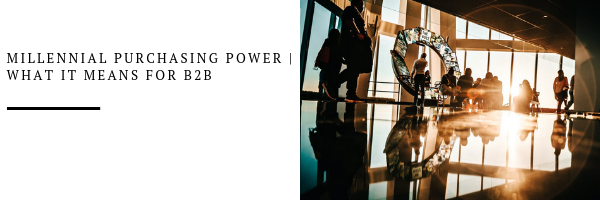Millennial Purchasing Power | What it Means for B2B

In past blogs we’ve discussed the impact Millennial purchasing power has on the marketplace at large and consumer preferences from the B2C perspective. However, Millennials are also making waves in the B2B sector. They are rising in rank in the workplace; they have higher leadership positions and more influence in purchasing decisions. Their identity as digital natives and their personal preferences as consumers impact the way they buy and sell for the companies they work for.
Attracting the Millennial Talent
Millennials, particularly those at the end of their generation, have never known the work environment without technology. They expect it to be integrated into the workplace flow. Some older generations may be hesitant to implement new technology whereas Millennials embrace it and assume that evolving technology will force adaptation in the workplace. In fact, Millennials are often the largest advocates for digital transformation in business.
As decision-makers within a company, Millennials use digital commerce tools to efficiently communicate with prospects and vendors. Sellers can use digital self-service tools and the like to streamline workflow and focus on building relationships with other businesses, rather than getting bogged down with paperwork. All this in mind, B2B companies must adopt digital commerce tools and other technologies in order to attract and retain Millennial talent.
Adapting to the Digital Native
Up-to-date technology is also vital for Millennials as buyers in B2B organizations. Research indicates that 73% of Millennials are involved in the purchasing decisions of their companies and potential Millennial buyers expect vendors to offer easy-to-use online and mobile platforms. They also perceive sellers as more trustworthy if they utilize technology.
In addition to record-high personal social media use, Millennial buyers also utilize these platforms as a forum to research potential vendors. Rather than performing a google search, they look to platforms like Facebook and Instagram for information. B2B companies must ensure that their branding and marketing cross over to social media to attract up-and-coming Millennial buyers and their purchasing power.
Customer Service is All About Trust and Commitment
Millennials have similar expectations of customer service for B2B brands that they do for B2C interactions. They expect that sales personnel will invest in the interaction to create a personalized client experience. In addition, almost 80% of buyers say that salespeople should serve as trusted advisors. Businesses can build this trust through effective use of technology.
B2B brand expert Howard Beindel notes that many B2B brands are shifting their customer service approach to focus on service design. They center on robust customer-driven experience for buyers. Again, and similarly to their B2C interactions, Millennial buyers expect potential vendors to fully commit to the client relationship.
Appeal to the Emotions
Emotional appeals are another way to build the trust Millennial buyers desire. We often associate emotional appeals with B2C interactions (i.e. heartfelt Super Bowl ads like Budweiser’s 2013 commercial “The Clydesdales”). But connecting to emotion is just as important in B2B marketing.
Don’t buy it? Research shows that the majority of B2B buyers have a stronger emotional connection to their vendors than consumers do with B2C brands. This is especially true of Millennials who are known for blending the boundaries between personal values (i.e. sustainability) and professional ideals, especially as daily life becomes more integrated with technology. As such, there is often a personal connection to the purchase for Millennials. Businesses can appeal to Millennial buyers’ emotions to grow the relationship and build trust.
The Million-Dollar Question: Why?
One way B2B companies can access these emotion-based appeals is by answering the “why” question. In 2010, Simon Sinek gave one of the most popular TED Talks of all time. He discussed why leaders like MLK Jr. and Apple were, and are, so radically different from their contemporaries. He refers to this as the golden circle (pictured right). Successful leaders and innovators are motivated by the “why” or the belief in what they do. Those who begin from the “what” are only concerned with the results and are often unsuccessful. Sinek insightfully noted, “People don’t buy what you do; they buy why you do it.”
Brands who can sell their “why” are more successful. And even though Sinek’s Apple example is of a primarily B2C company, it still rings true for B2B brands as well. If Millennials buyers believe what you believe they will buy from you. After all, as Sinek says, “What you do simply proves what you believe.”
What Does This Mean for the Sign Industry?
Along with the moral and emotional preferences of Millennials, signage companies must also cater to their design aesthetics. Many companies either have or are currently going through rebrands, and Millennials are a part of this process. Signage is integral to site branding, and their design preferences will influence how they help their companies brand and rebrand. Signage companies can obtain corporate Millennial business by offering products that appeal to this generation’s dual aesthetic and utilitarian preferences, like a minimalistic and energy-saving design.
Millennials are the rising players in the B2B marketplace, especially as their personal values cross over into their preferences as buyers. B2B companies can attract these potential buyers (and retain them as sellers) by marketing why they do what they do, adopting new technology, ensuring a rich client experience, and implementing green practices. In this changing marketplace, Millennials are the bandwagon and it’s time for B2B companies to jump on.
Check out our other blogs addressing Millennial purchasing power focusing on their financial status and what they value in the marketplace.
